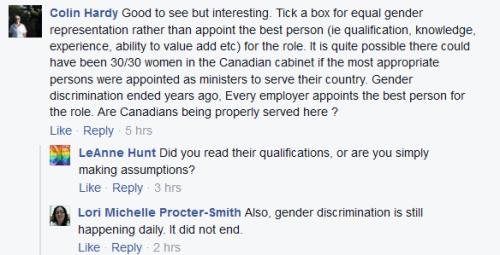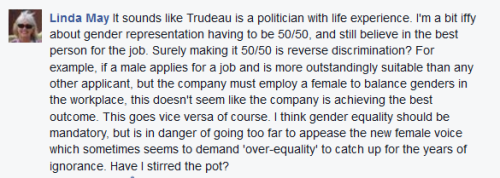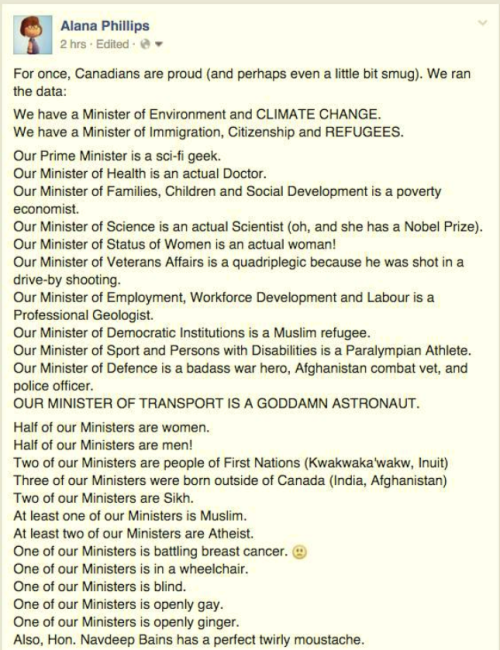At Justin Trudeau’s swearing-in as Prime Minister of Canada on November 4, 2015 he was asked by a reporter why he thought it was important to have a cabinet that is 50% women. His answer was simply to say, “Because it’s 2015,” and then give a shrug.
But, just as The Beaverton (Canada’s premiere satirical news website) predicted “50% female cabinet appointments lead to 5000% increase in guys who suddenly care about merit in cabinet.” (Click here if you prefer serious discussions to satire).
For example, here are some comments posted to Miss Representation’s Facebook post discussing the new cabinet:

Good to see but interesting. Tick a box for equal gender representation rather than appoint the best person (ie qualification, knowledge, experience, ability to value add etc) for the role. It is quite possible there could have been 30/30 women in the Canadian cabinet if the most appropriate persons were appointed as ministers to serve their country. Gender discrimination ended years ago, Every employer appoints the best person for the role. Are Canadians being properly served here ?
This comment compares government to private business “employers” but I think there is a significant difference between government and business, namely our system of government is representative, and so there might be a stronger case to be made that those who hold important positions within government offices should be representative of the population they are meant to, you know, represent.
Whereas private businesses have no mandate to represent any one in particular (except, perhaps, the shareholders), the government is created for the express purpose of representing the people. The two cases are not analogous, and I think a stronger case could be made to say that the government has an obligation to be representative of the demographics of the country.

if women only make up 20 or 30% of the MP’s… why do they get 50 % of cabinet posts? Male discrimination!!!!
Here is the second thing that I think is interesting about the merit and representation discussion. First, I think it is revealing what kinds of representation gets focused on. In both of these comments (and the one below) it is gender-representation that is called into question. The argument seems to be that we don’t need a cabinet with a gender-distribution that represents and reflects the general gender-distribution of the Canadian population, and if we did try for such a cabinet we would thereby be sacrificing quality.
What I find interesting about this type of argument is not what is said, but rather what is not said. For example, Trudeau also tried to create a cabinet that had representation from across the Canadian provinces and territories in proportions that are roughly proportional to the populations in each. But we do not hear that this kind of quota-based representation is going to undermine merit. Nor do we hear that it is unfair because there is only 1 MP from Nunavut so it seems an over-representation to have any one from Nunavut in the Cabinet.
So why might it be that when we are talking about trying to create a cabinet with a gender-distribution that represents the gender-distribution of the country some people suddenly raise a number of concerns about the merit of the ministers selected. In contrast, when the Prime Minister tries to create a cabinet with a regional-distribution that represents the regional-distribution of the country (even when this means that some regions will be over-represented with respect to the population distribution of that region) we do not hear concerns about the merit of those found in the different regions. Why is there the difference in response based on different kinds of quota-based representation? I think the difference shows that there is a presumption that women lack qualifications, but there is not a presumption that there is a lack of qualifications attached to the different regions of Canada in which a minister might live.
I think The Beaverton article is funny, but I do take issue with the use of “guys” in the title of the article, because women are just as likely to be biased against women’s merits as are men (the implicit bias test at Harvard demonstrates that sexism against women is not limited to men, but also affects judgements made by women about other women’s merits). To show that I think women can be sexist, too, here is a comment by a woman from the Miss representation thread:

It sounds like Trudeau is a politician with life experience. I’m a bit iffy about gender representation having to be 50/50, and still believe in the best person for the job. Surely making it 50/50 is reverse discrimination? For example, if a male applies for a job and is more outstandingly suitable than any other applicant, but the company must employ a female to balance genders in the workplace, this doesn’t seem like the company is achieving the best outcome. This goes vice versa of course. I think gender equality should be mandatory, but is in danger of going too far to appease the new female voice which sometimes seems to demand ‘over-equality’ to catch up for the years of ignorance. Have I stirred the pot?
In any case, even if we are only looking at these alleged concerns about the “merit” of the ministers chosen for the cabinet from the perspective of argument analysis we already have reason to think that bias against women’s merit and leadership is at work because of the uneven way the concerns are mobilized against gender, but not regional, representation. And that is before you even look at the evidence: the women Trudeau chose have considerable merit and expertise for the portfolios they will be responsible for. Each of the previous links has a serious analysis, but to keep with the Facebook analysis:
Merit, representation, bias.

